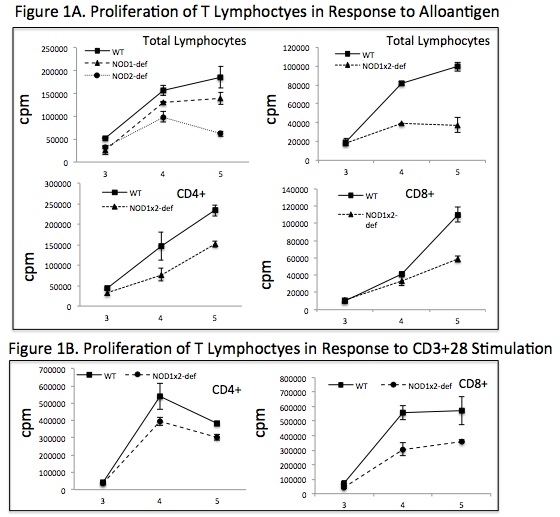Absence of Nucleotide-Binding Oligomerization Domain-Containing Protein 1 and 2 Modifies Adaptive Immune Responses
Medicine, UCSD, La Jolla, CA.
Meeting: 2015 American Transplant Congress
Abstract number: D25
Keywords: Apoptosis, Bone marrow transplantation, Graft-versus-host-disease, T cells
Session Information
Session Name: Poster Session D: Costimulation and Signaling in Lymphocytes
Session Type: Poster Session
Date: Tuesday, May 5, 2015
Session Time: 5:30pm-6:30pm
 Presentation Time: 5:30pm-6:30pm
Presentation Time: 5:30pm-6:30pm
Location: Exhibit Hall E
Background:
The NOD family of intracellular pattern recognition receptors (PRRs) plays a key role in immune responses to microbial and danger signals. This family of proteins has been shown to regulate proinflammatory molecule secretion and cell death signaling. Substantial data have emerged defining the role of the NOD family of PRRs inflammatory diseases that involve both innate and adaptive immune responses.
Methods:
NOD1 and NOD2 are the best-characterized members of the NOD family. To better understand whether the receptors might provide a rationale target for modifying adaptive immune responses, we analyzed whether NOD1 and 2 receptors play a role in allogeneic and T cell receptor (TCR) mediated T cell responses. APCs and T cells were isolated from WT (H-2b), NOD1-/-, and NOD2 -/- and mice deficient in both receptors (NOD1x2-/-) (all H-2b) mice. Ex vivo T cell responses to alloantigen (BALB/c, H-2d) and CD3+CD28 TCR stimulation were assessed over time.
Results:
Shown in Figure 1, the absence of either NOD1 or NOD 2 in T cells inhibited proliferation to alloantigen, although the effect was greater in the absence of NOD2. CD3/CD28 TCR stimulation was likewise affected by the absence of these PRRs. The diminished proliferative responses were accompanied by decreased production of pro-inflammatory cytokines IFN-g, TNF-a and IL-6 (data not shown). CD8 T cells were affected to a greater degree by the absence of NOD receptors than were CD4 T cells. The absence of the NOD receptors in DCs though had no effect on induction of T cell proliferation to antigen (data not shown).

Conclusions:
Our data demonstrate an important role for the intracellular PRRs, NOD1 and NOD2 in T cell proliferation to antigen and TCR stimulation. Interestingly, CD8 T cell responses are affected to a greater degree than CD4 responses. Our laboratory is currently evaluating specific TCR-mediated defects that accompany the absence of these pattern recognition receptors and in vivo functional affects associated with the lack of alloresponses in the absence of NOD receptors.
To cite this abstract in AMA style:
Kasimsetty S, Shigeoka A, McKay D. Absence of Nucleotide-Binding Oligomerization Domain-Containing Protein 1 and 2 Modifies Adaptive Immune Responses [abstract]. Am J Transplant. 2015; 15 (suppl 3). https://atcmeetingabstracts.com/abstract/absence-of-nucleotide-binding-oligomerization-domain-containing-protein-1-and-2-modifies-adaptive-immune-responses/. Accessed February 16, 2026.« Back to 2015 American Transplant Congress
